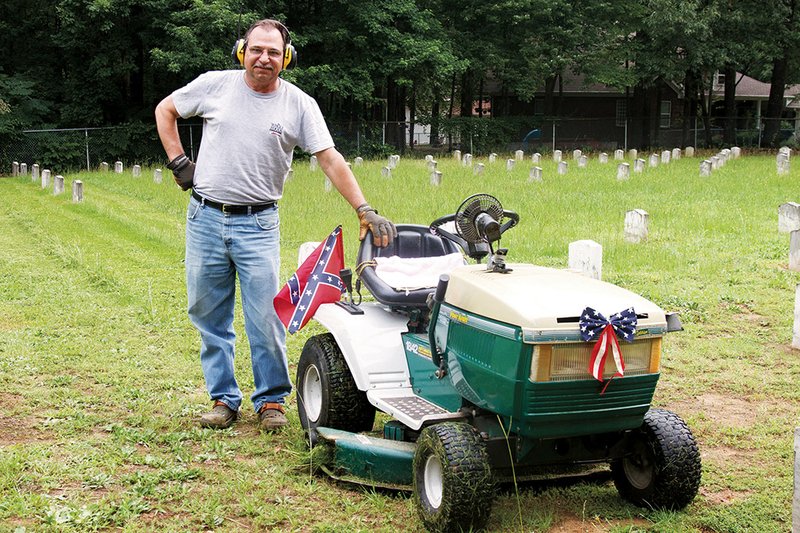CABOT — Tucked away from the main road near a playground and a few houses, a quiet spot of land marks the memory of soldiers who died long ago in a war that tore the country in two. Now, one volunteer makes his way to the cemetery on a regular basis to make sure the grounds are kept neat in respect of the fallen soldiers.
During the fall of 1862, 1,500 Confederate soldiers from Arkansas and Texas died of measles, typhoid fever or dysentery at Camp Hope near present-day Cabot, according to historical information from the Cabot Advertising and Promotion Commission. The soldiers’ remains were buried in unmarked graves in the surrounding area.
Brig. Gen. Allison Nelson, who was in command of the brigade, died Oct. 7 of that year. At that point, Camp Hope was renamed Camp Nelson in his honor.
In the early 1900s, about 500 bodies that had been buried in shallow graves after the 1862 epidemic were reburied at the Camp Nelson Confederate Cemetery. In 1906, the cemetery was dedicated with a 12-foot obelisk, and stone markers were set up in memory of the unknown soldiers.
At some point, after years of neglect, the cemetery became overgrown, and in 1981, local residents restored the grounds with new headstones.
Thirty years after that restoration, local resident Gary Chapman went out to the cemetery to see the site. Chapman said he enjoys Civil War history, and he had seen signs for Camp Nelson, so he decided to check it out.
“I drove in, and the weeds were taller than the stones,” he said. “For the last few years, everybody quit funding maintenance on it, so it was up to volunteers. I saw that and knew there weren’t many people volunteering. I’ve got a lawnmower, so I decided I’d do it.”
Chapman said he maintains the cemetery and the area directly adjacent to it throughout the year. The whole project takes about six hours, including mowing and weed eating, and in the summertime, he said, he usually mows at night because of the heat.
“One year I was out here mowing, and it started off overcast and kind of cool,” Chapman said. “I was mowing along, started right at daybreak. All of a sudden, I didn’t realize the clouds had burned off, and the sun was baking me. I jumped in the car, max AC, and I think I was right on borderline heat stroke.”
His riding lawnmower — which is old and threatens to quit on him — has been fit with an old trailer taillight so Chapman can see at night.
Chapman has met people who come out to visit the site and hands out pamphlets about the history of Camp Nelson, and he said he just wants visitors to be able to visit the cemetery without having to fight through weeds and unruly landscaping.
“Once, while I was sitting there cooling down, I looked over, and a dad and his two kids were walking around. The kids were running up and down and playing and having a good time,” Chapman said. “And that’s why I do this. When I got out and walked over, I could hear him explaining to them about the Civil War. That’s what it’s all about right there — people getting into the history of it all.”
One time when Chapman was working in the cemetery, a Vietnam veteran came to the site to play his flute in the cemetery. When he and Chapman started talking, he realized Chapman was a volunteer and the main caretaker of the grounds.
“He reached in his pocket and handed me $20,” Chapman said. “He said he wanted to throw something toward helping take care of [the cemetery]. I told him he didn’t have to, but he said he appreciated me taking care of it. That’s the only person who’s done that.”
Chapman is not looking for praise, and he does not ask for donations. He said he takes care of the cemetery because it is his way of serving the community.
“This is my little way of giving back,” he said, “but I think everyone should find some way to give back to society in their own little way.”
Staff writer Angela Spencer can be reached at (501) 244-4307 or aspencer@arkansasonline.com.
